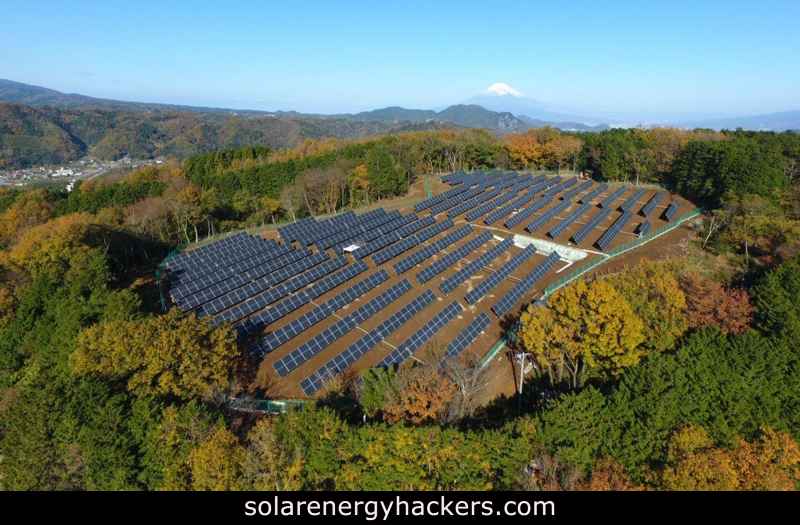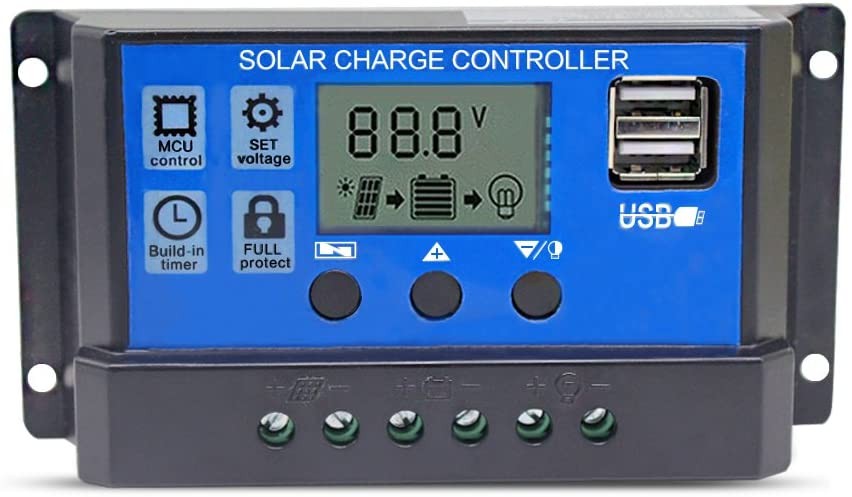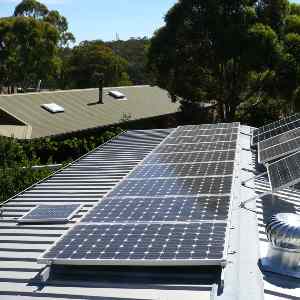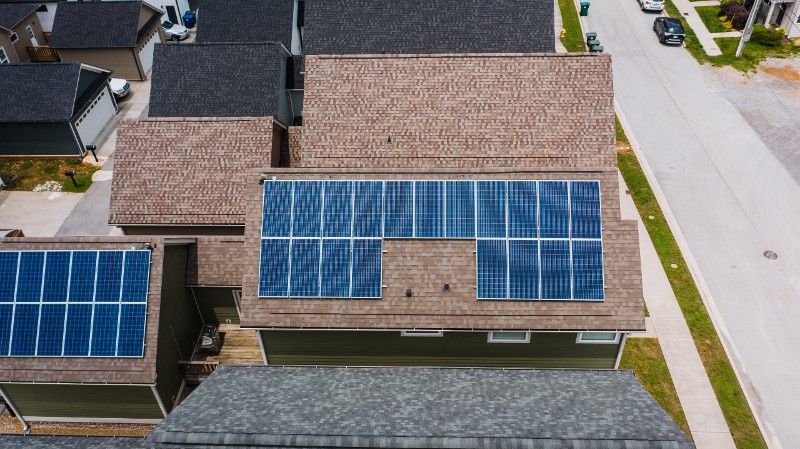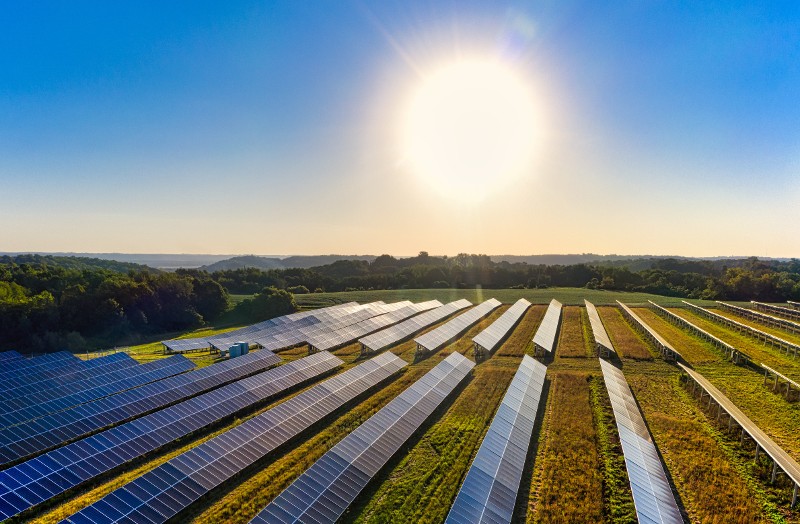I get this question a lot.
And the answer is no, solar panels don’t store energy.
When solar panels are producing electricity, the priority is always to power your home appliances.
If there is any excess energy, you’ll either sell it to your utility company (for grid-tied systems) or use it to charge your battery (for off-grid systems).
If you can’t send it to the grid or use it to charge a battery, then this energy goes to waste.
In this article, you’ll discover what is electricity, how solar panels generate it, and some of the most common ways to store energy.
What Is Electricity?
Before we get into how solar panels generate and store electricity, first, let’s take a moment to discuss what electricity actually is.
If you were paying attention in chemistry class, you might remember that atoms are made up of extremely tiny particles called protons, neutrons, and electrons.
Now, what we really care about is the electrons.
Electricity is nothing but lots of electrons moving through a conductor (a wire).
So, if you were able to take electrons from the atoms and force them to flow through a conductor, you would have electricity.
It’s that simple.
There is a catch, though.
The atom doesn’t want to lose its electrons, so you must rip it off by force.
Some ways to do it are by using magnetic force like in dynamos, heat like in thermoelectric generators, or sunlight like in solar panels.
In the next section, you’ll discover exactly how solar panels use sunlight to get electrons.
How Do Solar Panels Generate Electricity?
Solar panels generate electricity using something called the photovoltaic effect.
But before I tell you what that is, let’s take a step back and discuss what is light.
In short, light is made of small particles called photons and these photons have energy.
Now, the photovoltaic effect is the discovery that when a photon hits an electron, it can transfer some of its energy to this electron.
And if this transferred energy is big enough, the electron can break free from the atom and become what we call a free electron.
Now, we have a bunch of free electrons flowing through the solar panel, what’s next?
Well, lucky for us, electrons are pretty lazy.
They want to flow through the shortest and least resistant path.
So, what we do is add some wires (busbars) to solar cells.
And since wires are less resistant than the solar panel material, the electrons will flow through them.
Do you know what we just created?
A flow of electrons, also known as electricity!
Of course, solar panels are made of special materials to maximize electricity production but I won’t go into detail here.
So, if you want to get nerdy, you can check out this article on how solar cells work.
Can Solar Panels Store Energy?
No, solar panels can’t store energy.
Here’s what happens instead:
Let’s say your solar panels generated 100Wh of energy at this very moment.
If you’re currently using any appliances, then this 100Wh of electricity will power them.
Now, let’s say you only need 90Wh at the moment, where does the other 10Wh go?
Well, there are 2 options:
First, if you have a grid-tied solar system, where your system is connected to the local grid, then you’ll send this excess energy to your utility company and get energy credit in return.
This is called net metering and it allows you to sell any excess energy to your local utility company.
If you have an off-grid solar system, on the other hand, then this 10Wh of energy will be used to charge your home’s battery.
And if your home battery is full, this 10Wh will simply go to waste.
So in short, solar panels don’t store electricity, you either send the excess electricity to the grid or use it to recharge your home battery.
How to Store Energy from Solar Panels?
Electricity itself can’t be stored. We can’t take a bunch of electrons and put them in a box for later use, unfortunately.
But we can convert this electrical energy to another form of energy that we can store, like heat, chemical, or kinetic energy.
And when we need our electricity back, we can use the stored energy to generate new electricity.
Obviously, we lose a lot of energy in the process, so we try to avoid this whenever possible.
If you are anything like me (a big nerd), you’d be interested in learning more about the different ways to store energy.
So here are some of the most popular options:
- Pumped Hydroelectric: This method uses electricity to power a pump that moves water into a high reservoir. When energy is needed, this water can be released down through a turbine, and as the turbine spins, it generates electricity.
- Compressed Air: This storage method uses electricity to compress air into a storage tank at very high pressure. These tanks are often stored in underground caverns to take advantage of the earth’s natural insulation. When energy is needed, the compressed air is released through an expansion turbine to generate electricity.
- Flywheels: This method uses electricity to spin a rotor so that the energy is stored as kinetic rotational energy. When we need energy, the rotor can spin a generator, just like a wind turbine.
- Batteries: Batteries convert electricity to chemical energy that can be released later to generate electricity. While this is one of the most popular methods for storing energy, it can also be very expensive.
Is a Solar Battery Bank Necessary?
No, you don’t need a battery bank unless you want to go totally off the grid.
If you opted for a grid-tied solar system, you can use the national grid as your battery, so it’ll save you a lot of money and hassle.
However, if you live in a remote area or you suffer from a lot of power outages, then a battery bank will be necessary unless you want to run your home with a noisy generator at night.
FAQs
Can Solar Energy Be Stored for Future Use?
Solar energy can be stored for future use with the help of a battery or any other energy storage method.
How Long Can Solar Energy Be Stored?
Solar energy can be stored in a battery for 2-6 months, depending on the battery type and quality.
Is Storing Solar Energy Expensive?
Storing solar energy is very expensive because you have to convert the electrical energy to another form of energy to store it, and then convert it back to electricity when it’s time to use it.
Last Words
Solar panels don’t store energy, but there are several options for storing the excess energy they produce, including pumped hydroelectric, compressed air, flywheels, and batteries.
If you’re looking to go off-grid or reduce your dependence on the grid, then a battery bank may be an important investment.

